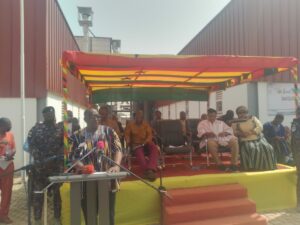Trade Minister inaugurates GH¢7.3m Savelugu Municipal Rice Processing Factory
 Trade and Industry Minister, Alan Kyerematen has inaugurated the Savelugu Municipal Rice Processing Factory to begin formal operations to process rice produced by farmers in the area to ensure increased earnings.
Trade and Industry Minister, Alan Kyerematen has inaugurated the Savelugu Municipal Rice Processing Factory to begin formal operations to process rice produced by farmers in the area to ensure increased earnings.
The Savelugu Municipal Rice Processing Factory, which received support through the government’s One District, One Factory (1D1F) Common User Facility (CUF) Initiative, has a state-of-the-art rice processing equipment with the capacity to produce 1.5 and 2.8 tonnes of processed rice per hour.
The construction of the factory commenced in January 2020 and was completed and handed over in July, 2021.
The processing plant installed at the factory included a modern parboiling, milling and packaging plants with a standby generator and a mechanised borehole to supply the factory with water.
It also has a warehouse, fully furnished office accommodation, a conference room, laboratory room and a canteen for the workers.
The total cost of the factory is about GH¢7.375 million, including the cost of factory building, processing plant and machinery, offices, office equipment and a Nissan Double Cabin Pickup vehicle.
Mr Alan Kyerematen, Minister for Trade and Industry, who inaugurated the factory at Savelugu in the Northern Region, said it would increase the productivity of farmers in the area.
The Savelugu Municipal Union of Rice Farmers Association LBG (the mother Association of all Rice Farmer-Based Organisations in the Savelugu Municipality), owned the factory by 70 per cent while the Ministry of Trade and Industry, the Savelugu Municipal Assembly, and the Traditional Council also owned 10 per cent each.
Mr Kyerematen said, “Despite the hard work of farmers in this area, they still remain poor because they are unable to take advantage of the full value of what they produce. This facility will help reverse the narrative.”
He swore into office a nine-member Board of Directors to oversee the management and operations of the factory.
Mr Akwasi Attah Antwi, National Director, Rural Enterprises Programme, said the factory was expected to employ about 118 people, including management professionals, factory floor workers and plantation workers, who would work on the nucleus rice farms.
He said, “In addition, over 754 farmers in the Savelugu Municipality and neighbouring communities will be directly engaged to supply rice to the factory.”
He said, “With funding from the African Development Bank, the Rural Enterprises Programme has established five of the CUFs nationwide; Savelugu Municipality of the Northern Region, Dormaa West District of the Bono Region, Sefwi Akontombra District of the Western North Region, Tarkwa Nsuaem Municipality of the Western Region and Sekyere Central District of the Ashanti Region.”
Alhaji Shani Alhassan Saibu, the Northern Regional Minister, said the factory would serve as a catalyst that would bring about the needed development in the region while enhancing food security in the country.
Hajia Ayishetu Seidu, Savelugu Municipal Chief Executive, said it would help address unemployment and attract young people into the agricultural sector.
She urged residents to take advantage of the initiative to enhance sustainable growth and development of the area.
Alhaji Sayibu Braimah, Chairman of the Board of Directors of the factory, pledged to discharge their duties efficiently to ensure that the factory achieved its intended purpose.
Meanwhile, Mr Kyerematen has also inaugurated the Savelugu Technology Solution Centre to facilitate the production of spare parts and repair services, manufacturing of agro-processing equipment, and providing training for human resource and capacity building for various businesses in the area, including the factory.
The government’s 1D1F CUF is a farmer-owned agro-industrial processing facility established with seed funding from the Ministry of Trade and Industry under the Rural Enterprises Programme.
It seeks to enhance the ability of farmers and other agricultural value chain actors, with little or no financial capacity, to establish their own common user processing facilities to process their farm produce.
Source: GNA
